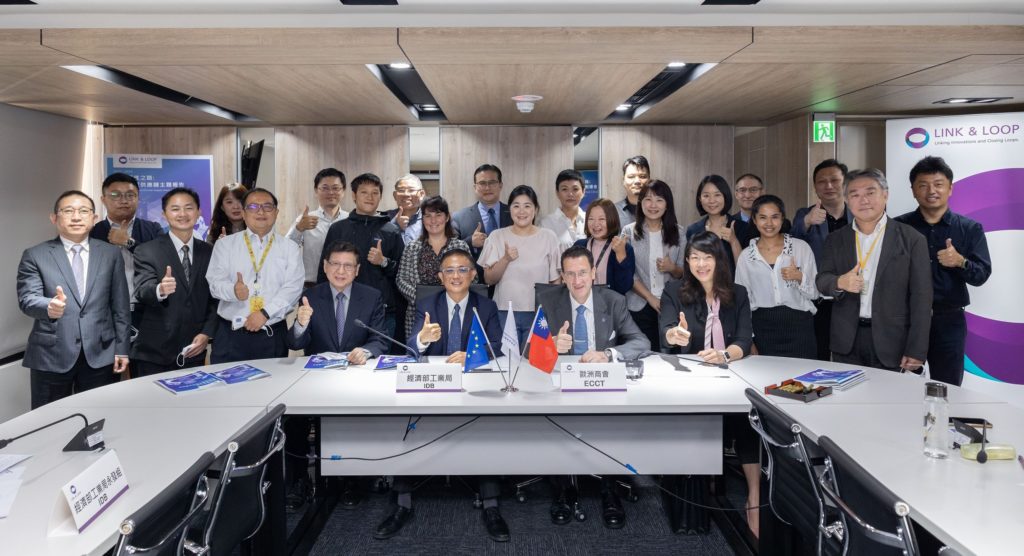[Event Report] 2021 Sustainable Supply Chain Report Launch Ceremony 永續供應鏈報告書發表
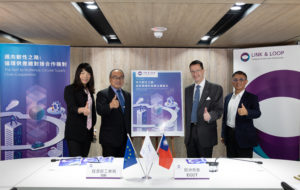
(LR) Low Carbon Initiative Director Sammy Su, IDB Director General Leu Jang-Hwa, ECCT CEO Freddie Höglund, IDB’s Sustainable Development Division Director Ling Yung-sheng
Photo Gallery: Facebook
Report: https://reurl.cc/VD8oN6
Press Coverage: PDF
-
The ECCT participated in the launch of report jointly released by the Industrial Development Bureau (IDB) under the Ministry of Economic Affairs (MOEA) and the ECCT’s Low Carbon Initiative (LCI) titled “The Path to Resilience: Circular Supply Chain Outlook for Taiwan and Europe”.
The report gives an introduction to initiatives in both Europe and Taiwan to build circular supply chains, highlights successful examples of circular procurement involving European and Taiwanese companies, and presents the IDB’s vision for promoting circular supply chain cooperation. In particular, it explains the IDB’s integrated information platform that enhances Taiwan’s existing waste reporting and control system to assist in the matching of suppliers of materials made from recycled goods with buyers.
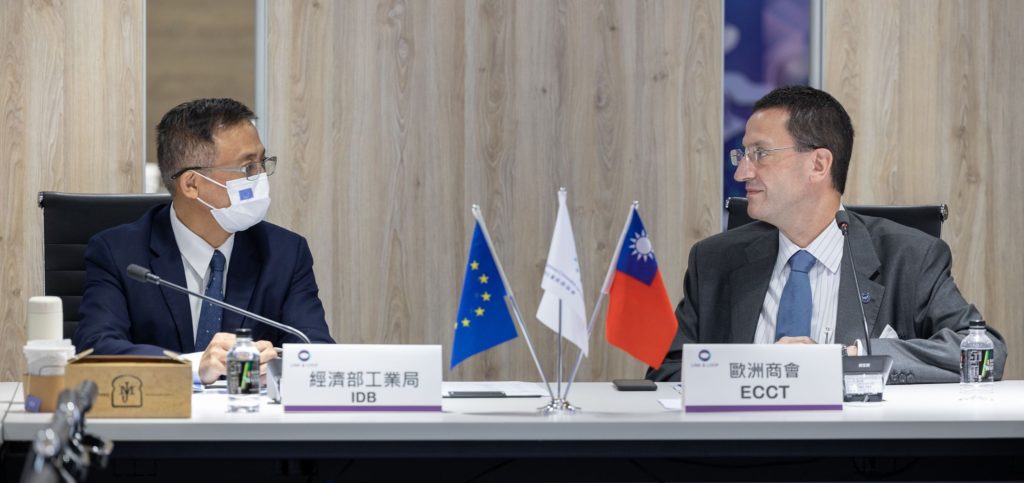
Director of the IDB’s Sustainable Development Division Ling Yung-sheng and ECCT CEO Freddie Höglund
At the event, opening remarks were made by Ling Yung-sheng, Director of the IDB’s Sustainable Development Division and ECCT CEO Freddie Höglund. This was followed by a presentation to introduce the report and a panel discussion hosted by Director Ling, featuring representatives from European and Taiwanese companies engaged in the supply and purchasing of recycled materials. During the Q&A session, representatives of suppliers spoke about their efforts to create circular materials while ECCT members shared their aspirations, experiences to date, and views on how to make further progress towards achieving circularity in their respective supply chains.
The report builds on cooperation between the LCI and IDB developed over several years. In particular, since 2018, the IDB has been working with the LCI to organise several international supply chain brand matching events, including international seminars on the circular economy, workshops on circular business models, and circular supply chain matchmaking sessions. At these events global brands such as Apple, Carrefour, Covestro, Decathlon, Dell, IKEA, Scania, Signify, and Unilever were invited to share their sustainability goals and circular economy strategies, to help domestic manufacturers understand their sustainable procurement standards.
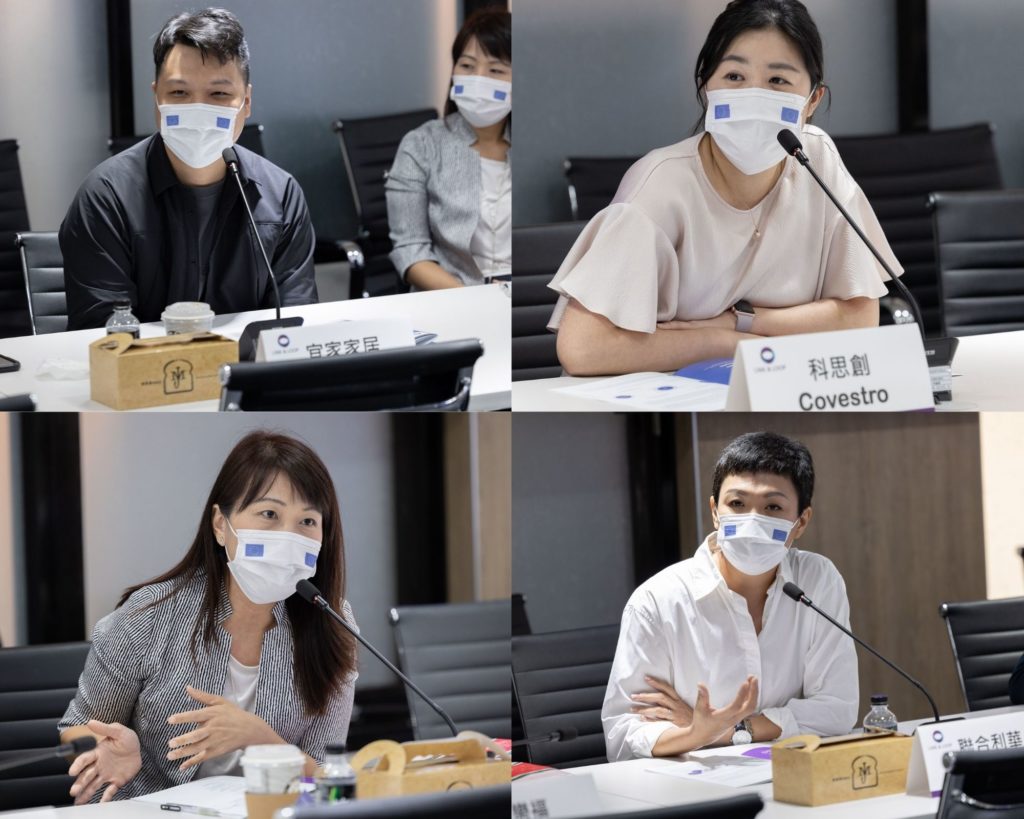 Representatives of Ikea, Covestro, Carrefour and Unilever
Representatives of Ikea, Covestro, Carrefour and Unilever
Government regulations on the circular economy as well as the drive by multinational corporations (MNCs) to reduce their carbon footprints and use of raw materials is accelerating the development of the global circular supply chain, which is anticipated to eventually replace the linear supply chain. For example, to manage and control the flow of various types of domestic waste, the Taiwan government has created a real-time reporting system, which allows manufacturers to fill in waste codes and production volume, and to report the waste transaction to other manufacturers.
In Europe, the European Commission’s New Circular Economy Action Plan puts strong emphasis on the development of sustainable products and focuses on resource-intensive industries such as plastics, textiles, electronics, batteries, and construction, supplemented by regulating the recycling of industrial waste. It does so mainly through regulations, such as the Packaging and Packaging Waste Directive (PPWD), and the Single-Use Plastic Directive (SUPD). For example, the SUPD stipulates that by 2025, PET bottles must contain 25% recycled materials and by 2030, all bottle containers must contain 30% recycled materials in the EU.
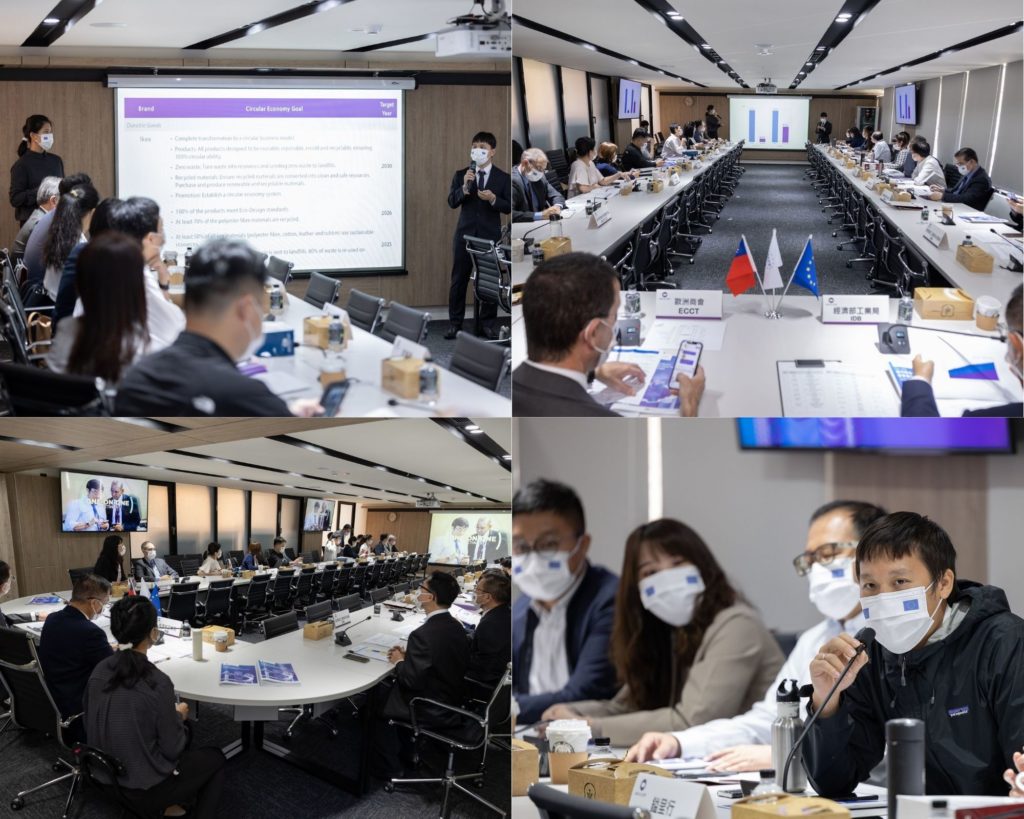
For their part, most global brands have set quantified circular economy goals with target years ranging from 2025 to 2030. Moreover, their goals also include their supply chains, with requirements such as zero waste and zero landfill and the reuse of scraps in the manufacturing process.
Under the sustainable procurement model, procurement specifications focus on the efficient use of resources and energy, and whether it has a large-scale impact on the environment and society. Taking plastic as an example, the polyester raw material "polyethylene terephthalate" (PET) is widely used in the production of plastic containers and textile garments. According to Bloomberg NEF's long-term forecast research report on the recycled materials market, currently, approximately 75% of the materials come from the mining of petrochemical materials, and 25% comes from recycled materials (rPET). With recycled materials gradually replacing virgin materials, the market share of rPET is expected to reach more than 80% in 2050.
Currently about 68% of aluminium is sourced from mining, while 32% comes from recycled materials. It is expected that with recycled materials gradually replacing virgin materials, the market share of recycled aluminium will exceed that of virgin aluminium in 2050.
BloombergNEF’s data suggests that replacing virgin PET with recycled PET can reduce greenhouse gas emissions by 53% and replacing virgin aluminium with recycled aluminium can reduce greenhouse gas emissions by 90%.
Since Taiwan is already advanced in the management of recycling and the production of reusable materials and European companies are increasingly demanding the replacement of virgin materials with those made from recycled products, Taiwanese suppliers and European brand name producers make ideal partners. For example, about 170 companies are producing recycled plastic materials in Taiwan, forming close industrial clusters in the central and southern industrial parks. They have supplied the world with various types of recycled plastics which are used in products such as sportswear and shoes. There are also around 150 recycled metal manufacturers in Taiwan, which convert waste from the electronic products, machinery, and other industries to produce ingots and other materials which are used to produce mobile phones and laptop computers.
Taiwanese companies have cooperated with international organisations and brands to convert marine waste to high-priced boutique products. For example, Far Eastern New Century, Li Peng, Nan Ya Plastics, Shin Kong Textile have partnered with global brands such as Nike, Adidas and IKEA in utilising innovative chemical recycling technologies and ICT sorting procedures to optimise waste (including marine waste and discarded clothing) to produce things like sportswear and sunglasses frames made from discarded fishing nets or using marine Styrofoam waste to produce keyboards and mice.
In addition, Taiwan has an annual output of about 140,000 tons of waste tyres. Thanks to an efficient recycling system, the recycling rate of waste tyres reaches 94%, of which 70% is converted to derivative fuels, and about 15% is upgraded into raw materials which are applied to various rubber products. For instance, one company has developed thermal pyrolysis technology to make eco-friendly recycled carbon black, which can be used as a raw material for wetsuits. Another makes children's play mats from waste rubber such as tyres.
According to the Global E-Waste Monitor Report of UN, about 54 million tonnes of electronic waste fails to be recycled each year, which is equivalent to a 10 billion-dollar loss of gold, platinum, and other precious metals. Taiwan is one of the main supply bases for the global ICT and electronics industry. A complete recycling system for waste from electronic waste generated in the manufacturing process to post-consumption electrical appliances and information products has been established.
However, despite these early success stories, there is still a lack of data and coordination that make it difficult for suppliers to find customers and customers to find suppliers. That is the gap that the IDB aims to fill.
To promote cooperation between global brands and domestic suppliers, the IDB has upgraded Taiwan’s unique waste declaration database into an "Industrial Information Platform of Circular Economy" and since 2020 has been focused on improving its "Brand-Supply Chain Matching Mechanism" to match supply and demand accurately and efficiently. The LCI was involved since the beginning by referring international companies to the IDB and initiating partnerships.
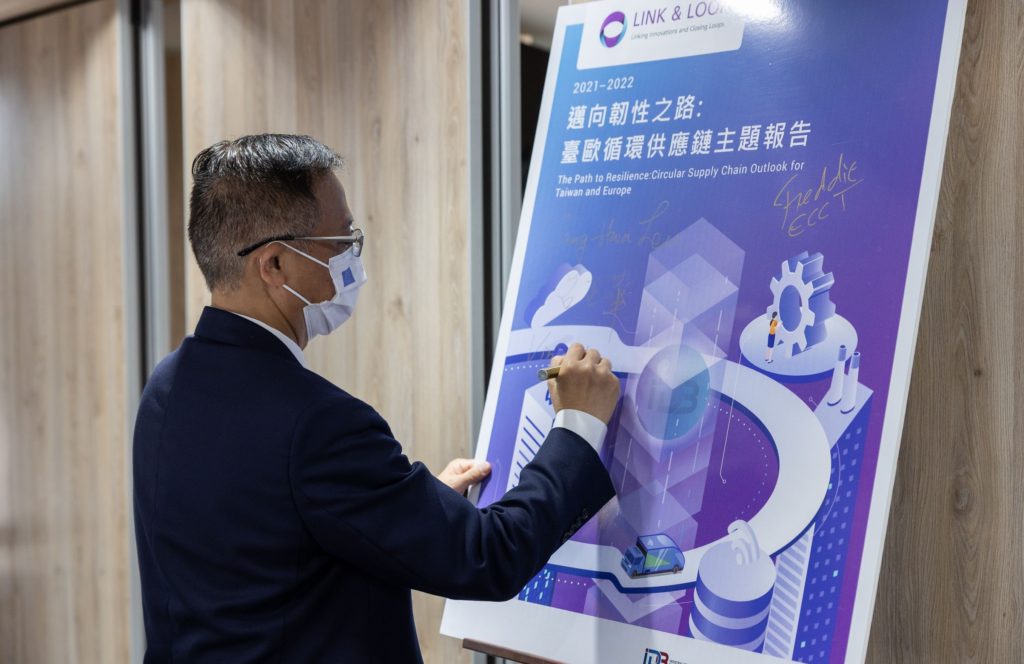
The next stage in the process is investigating brand procurement requirements. In this stage, the Industrial Development Bureau conducts interviews and investigations on the procurement needs of the brands. The bureau and the brands establish a list of prioritized items and sign a confidentiality agreement based on the needs of the brands.
After confirming the brand’s demand, the Industrial Development Bureau team then filters for potential matching suppliers through its database, and then inspects their production capacity and the quality of their recycled materials. Afterwards, the bureau confirms their matching intentions through meetings and compiles a list of suitable potential suppliers for the demand side.
The next phase is matching supply and demand. Brands first select suppliers from the potential supplier list, and the IDB assists by organising matching meetings.
Finally, the IDB facilitates continuous cooperation. Acting as a neutral third party, the IDB not only facilitates the signing of letters of intent between the two parties but also provides consultation on things like recycling-related laws and regulations, green upgrades, and applications for government subsidies.
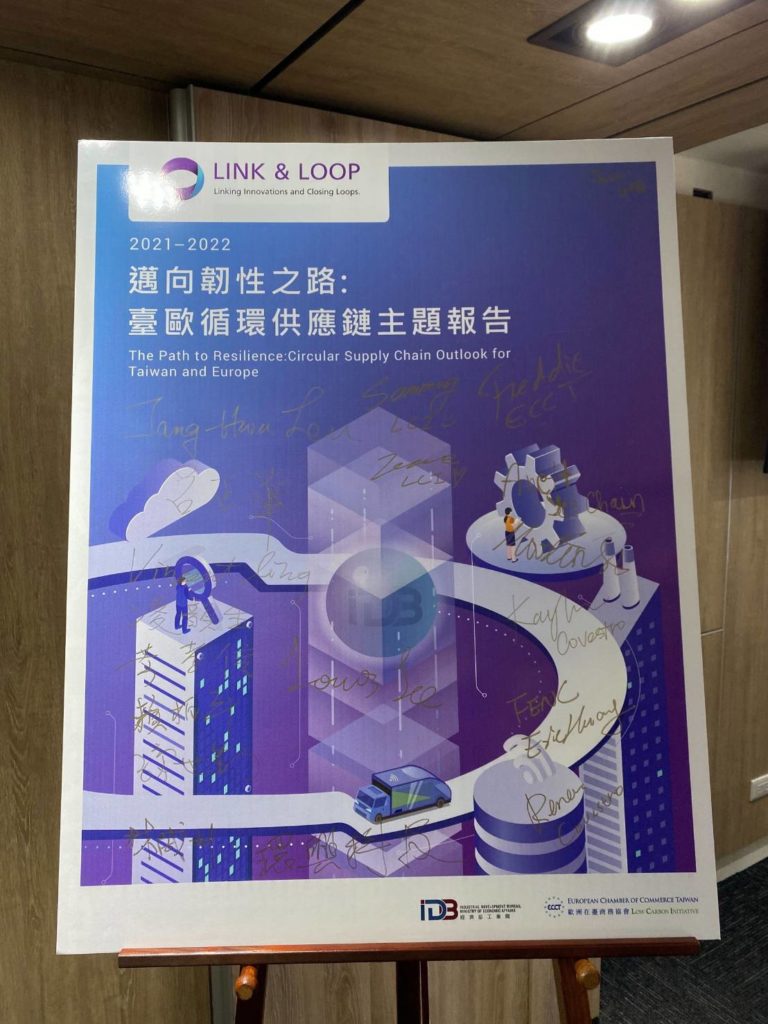 The report concludes with three recommended actions:
The report concludes with three recommended actions:
To strengthen the links between circular technology and the market by introducing concepts of product re-design
To provide quality and trace verification for products to meet international standards
To achieve net zero emission targets by making circular models scalable and replicable.
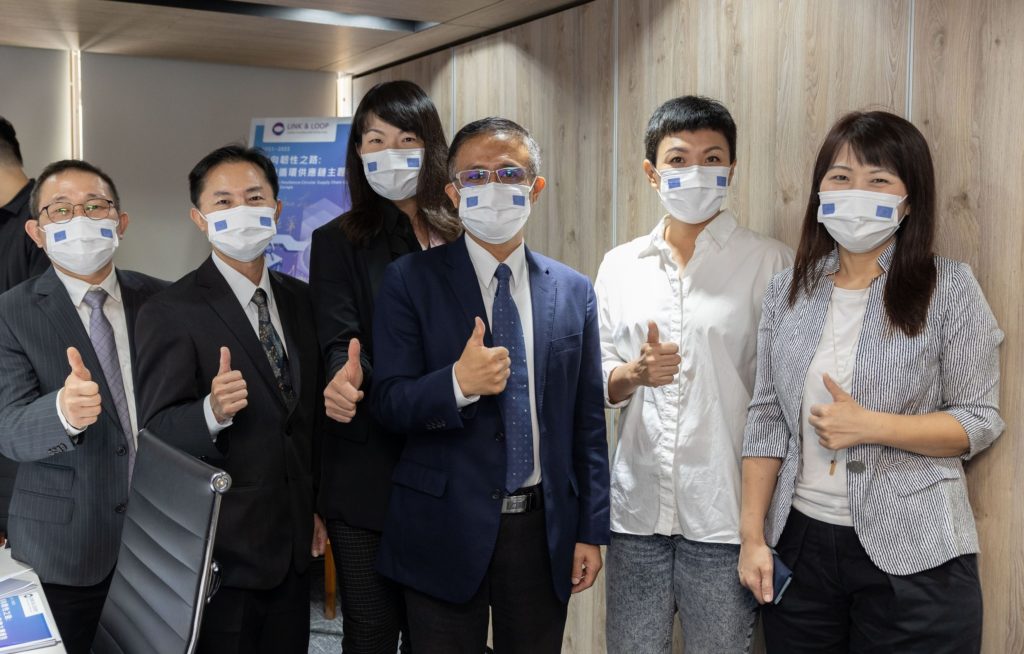 Since the IDB and ECCT share the same goals, the ECCT, through the LCI, will continue to work with the IDB to promote the Brand Supply Chain Matching mechanism to its members and thereby facilitate the closing of production loops needed to create a circular economy both in Taiwan and Europe.
Since the IDB and ECCT share the same goals, the ECCT, through the LCI, will continue to work with the IDB to promote the Brand Supply Chain Matching mechanism to its members and thereby facilitate the closing of production loops needed to create a circular economy both in Taiwan and Europe.
